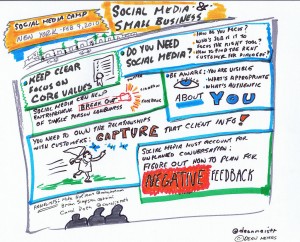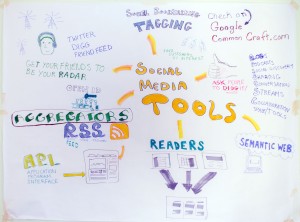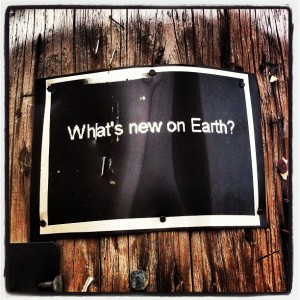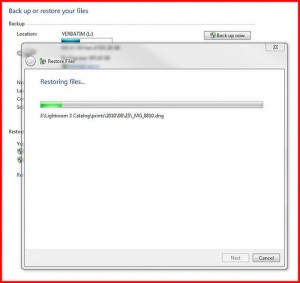Strategies for managing social media information – Frequently asked questions February 8, 2013 No Comments
 Here are a whole host of questions we have received about managing social media information. We will continue to add to this list of FAQs as people ask us more interesting social media questions.
Here are a whole host of questions we have received about managing social media information. We will continue to add to this list of FAQs as people ask us more interesting social media questions.
1. How do I determine what records from my organisation’s social media activities need to be retained?
2. My IT manager says social media applications are not official business systems and therefore we don’t need to keep records of corporate social media activities. What should I say to her?
3. Do I really have to make official records to document what my organisation is doing on Facebook? If so, how do I do it?
4. Can I keep social media records in the business system that generates them?
5. Do I need to know the time and date that I broadcast a particular social media message and know when someone receives it?
6. With my social media records, do I need to keep them in their original format and make sure they look just like they did in their original social media environment?
7. Is Facebook a government business system? My IT section says that it is not.
Strategies for managing social media information – how do I capture social media records? 9 Comments
 As social media is relatively new and rapidly evolving technology, there are no defined, best practice ways for making and keeping social media records.
As social media is relatively new and rapidly evolving technology, there are no defined, best practice ways for making and keeping social media records.
Organisations also use different social media channels, in a variety of different ways and for various different types of business operations.
Given there are no easy answers for how you should capture and keep your social media records, you should choose the strategies that best meet your business needs and technological environment, while making a full assessment of the potential risks involved. Read the rest of this entry »
SharePoint 2013: new functionality and what it might mean for recordkeeping February 5, 2013 2 Comments
Last year State Records published guidance on the recordkeeping capabilities of SharePoint 2010. This guidance describes recordkeeping features and functionality that can be enabled or configured in SharePoint, and identifies where additional configuration and/or add-on software are needed to meet particular recordkeeping requirements.
We have started to receive enquiries about the recordkeeping capabilities of SharePoint 2013 (scheduled to be released soon), so we thought we would provide a brief overview of some of the additional functionality in this version which may impact on recordkeeping. Read the rest of this entry »
Looking back, looking forward – the top 10 posts on Future Proof in 2012 – what’s of interest to the RM/IM profession January 31, 2013 No Comments
As 2013 heats up, Emma and I have been looking over the 2012 Future Proof blog statistics to identify what topics were of particular interest to our Future Proof community.
The Top 10 of Future Proof in 2012 is an interesting list and it is providing us with really useful input into our workplanning for the coming year. So thanks for continuing to support Future Proof, and here, according to the stats, are your favourite posts from 2012!
Challenging questions on social media and the cloud – interesting enquiries to State Records NSW in December 2012 January 24, 2013 No Comments
Here are some of the really interesting digital recordkeeping enquiries that the Government Recordkeeping section at State Records received in December.
- We are using a cloud-based business system but need to export key records out of it and back into corporate business systems. What do we do with the copies of records of these records that stay in the cloud?
- Do I really have to make official records to document what my organisation is doing on Facebook? If so, how do I do it?
- Can I keep social media records in the business system that generates them?
- Do I need to know when I broadcast a social media message and know when someone receives it?
- What does the requirement for read-only records actually mean and how do I achieve it?
- With my social media records, do I need to keep them in their original format and make sure they look just like they did in their social media environment?
- Should I use PDF or PDF/A for document scanning?
- Will State Records be providing new advice on recordkeeping in SharePoint 2013?
- Can I modify and use State Records’ e-learning courses in my own organisation?
The advice we provided in response to these questions is listed below. If you have any comments, suggestions or feedback on the advice we gave, please do let us know! Read the rest of this entry »
SharePoint 2010 pilot project at Bankstown City Council January 9, 2013 No Comments
Last month, Kate Cumming and I met with Melissa Ratkun, Claude Wetsteyn and Anita Franjieh from Bankstown City Council to talk about Council’s SharePoint pilot project and see a demo of some of the functionality implemented.
In 2012, Council ran a pilot project to test whether SharePoint 2010 could meet Council’s document and records management needs and introduce improvements to Council’s information management practices. Read the rest of this entry »
Back up systems are not recordkeeping systems December 21, 2012 No Comments
http://www.flickr.com/photos/dibytes/5935427993/
Last month we reported that backup systems are not recordkeeping systems.
Since then, our excellent colleagues at the Public Record Office of Victoria have developed an Issues Paper, Use of Back-up Technology to Archive (comments due 31 December).
Their Issues Paper states that the use of backup technologies to archive data will not meet the recordkeeping standards of the Public Record Office.
Digital Awareness Month at State Records – the dream is over December 17, 2012 No Comments
During the final week of DAM2012, Richard Lehane talked about State Records’ Open Data Project and the development of a web API to State Records’ catalogue, Archives Investigator. The API won a Mander Jones Award for the best finding aid to an archival collection held by an Australian institution or about Australia.
The fourth and final newsletter for DAM2012 continued with this theme, looking at the ways in which archives are being made available online as well as the impact that ‘digital natives’ might have on archives. To find out what State Records employees were reading about during DAM2012, read on! Read the rest of this entry »
What recordkeeping functionality do business systems need to provide? December 13, 2012 4 Comments
http://www.flickr.com/photos/webatelier/5929855686/
Janet Knight and I were having a conversation the other day about what it is that recordkeeping systems are supposed to do. We were asking what are the functional requirements for recordkeeping that should be incorporated into business system design or development to support recordkeeping, or used to assess business systems from a recordkeeping perspective.
This is our first very drafty of a set of high level requirements. We would really love your comments, criticism and advice.
We would really like your advice on what types of functionality do you think need to be baked into systems, or considered at system development and implementation, to better support recordkeeping? What have we left out? Where do we need to be more specific? What makes sense in our list and what does not? What is feasible? What’s a priority? What other types of requirements sets do we need to consider? For example, what are statements that need to be included in contracts with cloud service providers? Shared service providers? Project collaborators? As usual, we would love your advice. Read the rest of this entry »
More digital recordkeeping FAQs from State Records NSW, November 2012 December 12, 2012 2 Comments
State Records staff were asked these key digital recordkeeping questions in November:
- Is a scanned signature legally admissible?
- Are scanned records legally admissible?
- What are the 5 most compelling arguments I can use to explain why storing records in file shares on the IT network is not a good idea?
- What type of information fields (metadata fields) should I include in a database?
- How long do I have to keep paper records after I scan them?
- How can I make and keep good records using SharePoint?
- What technical standards and specifications does my scanning program have to meet?








